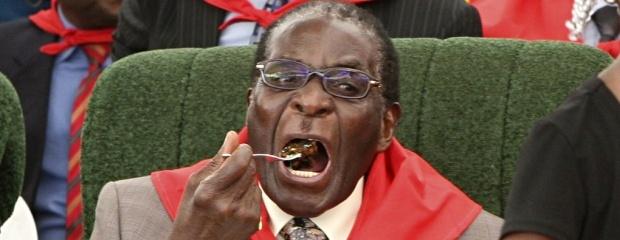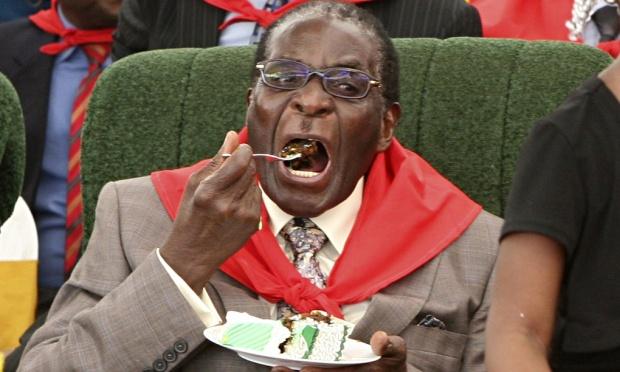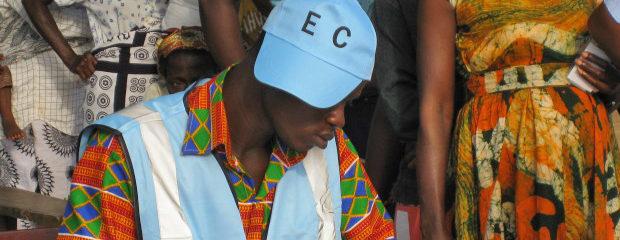Zimbabwe: Mugabe’s birthday celebrations obscure Zanu PF’s never ending wars – By Tendai Marima


Discussion of lavish party plans for President Mugabe’s 91st birthday have done much to obscure internal rumblings within Zanu-PF.
A million dollar feast awaits an old African king in Zimbabwe this weekend as President Robert Mugabe celebrates his 91st birthday, but beyond the elephantine pomp and fanfare lie tempestuous factional battles for the ancient lion’s throne. A seasoned maverick, Mugabe has survived this long by eliminating his challengers and enemies through use of the coercive arms of the party and state, but his 40 year rule of Zanu PF has bred far more infighting than stability.
Born out of a breakaway faction from the mother party, Zimbabwe African People’s Union (ZAPU) in 1963, Zanu PF has always been afflicted by factional politics. Mugabe’s own rise to First Secretary in 1975 was partly the product of an earlier split and throughout his reign, factional battles based on ethnic division, clan rivalry, political enmity and electoral contest have played themselves out in different ways. Often Mugabe has benefitted from these divisions, enabling him to consolidate power and legitimize his one-man rule. As can be seen from the current rumblings, Mugabe is a more powerful leader, but the party’s undemocratic political environment is a toxic breeding ground for greater friction.
The dismissal of former Vice President Joice Mujuru and at least 17 cabinet ministers accused of factionalism and plotting Mugabe’s assassination have eliminated the Mujuru faction from the race to succeed the aging leader and reaffirmed Mugabe as the centre of power in the party. Amendments to the party’s constitution in the run-up to the Zanu PF People’s Congress held in December 2014 made Mugabe sole authority on appointments to the Politburo, the party’s decision-making body. Loyalists praised this as an effective measure in blocking plotters and stamping out factionalism, but the crusade to drive out Mujuru has only multiplied fights among Zanu-PF comrades.
Didymus Mutasa, one of the oldest remaining members of the liberation era, was recently expelled from the party and sacked as Minister of State in the President’s Office. Maligned as the chief instigator of Mugabe’s alleged assassination attempt, Mutasa and his allies, including Rugare Gumbo, former Zanu-PF spokesperson, are bent on challenging Mugabe. Some observers forsee a minor splinter group forming around Mutasa who remains an MP until formally recalled by the party. However, Mugabe will be wary of precipitating by-elections, in which Mutasa and his allies would surely stand, for fearing of allowing the expelled individuals a political platform to air grievances on the national stage.
Other than the disgruntled Mutasa and those around him, an emerging group of Young Turks has also been making noise over the appointment of Mugabe’s heir apparent and faction leader, Emmerson Mnangagwa, as Vice President after Mujuru’s exit. Known as “˜the Gang of Four‘ (G4) or “˜The Committee’ in wider circles, it is made up of the remaining members of Generation 40, a group of six 40 something ministers who supported First Lady Grace Mugabe’s rise to National Secretary of the Women’s League.
Expecting greater reward for their help, the quartet are reportedly unhappy over Mnangagwa’s elevation. G4 member, Patrick Zhuwao, Mugabe’s nephew, has asserted that Mnangagwa’s vice presidency does not necessarily mean Mugabe’s succession is a done deal. While Zhuwao is correct, the fact is that Mnangagwa is the current first Vice President of Zimbabwe and Second Secretary of the party. In the event that Mugabe is absent or unable to perform his role, Mnangagwa is constitutionally authorized to step in as acting leader. A distrusted, crafty politician Mnangagwa may not be a universally approved choice, but Mugabe appears determined to become a life president and is therefore unlikely to hand over power – the individual who is his deputy at the time of his eventual passing is most likely to take over as an interim figure.
The issue of Mugabe’s succession has been a burning question within Zanu PF for close to two decades, but the 91 year old has been reluctant to name a successor. His secretiveness has been the cause of many fierce factional battles, but it is becoming apparent that this could well be a strategy to advance his own agenda at the expense of the party.
The entry of First Lady Grace into party politics can arguably, be seen as the stirring of a self-centred political project designed to maintain the Mugabe legacy. Grace led a vicious and successful campaign demanding Mujuru step down. Responding to the call, war veterans and party youths demonstrated and engaged in physical confrontations with pro-Mujuru supporters who held smaller counter-protests around the country.
In return for corralling the masses to action, Mugabe has rewarded his wife with greater power. As Secretary of the Women’s League she was recently appointed to the Presidium, Zanu-PF’s highest body. While a procedural appointment in terms of the party’s 2004 resolution on gender parity, her seat at the top table has raised eyebrows. As ‘Gucci Grace’ gains more power, her role as a potential contender, kingmaker or spoiler in her husband’s succession, becomes much more interesting.
For almost half his life Mugabe has presided over a divided movement, but at 91 there is an increasingly mortal limit to his rule. Should the factional scrambles over Mugabe’s succession continue to escalate, they may one day threaten not only his own interests, but Zimbabwe’s stability too. Perhaps, as Mugabe looks forward to celebrating his 35th year in power, the best gift he could give a nation uncertain of its future is ensuring that Zanu-PF’s hive of elite conflict is contained within the political realm and does not infect the country’s wider population.
Tendai Marima is a freelance journalist and academic researcher. Follow her on Twitter @i_amten.







Whatever is happening in ZIMBABWE is exactly what was happening in our Country Kenya when the former president Daniel Arab MOI was about to leave Office.But its not good for the Country for ZIMBABWE will not get the right leader who is to lead the country.
It seems to me you went out of your way to find the most unpleasant picture of President Mugabe so that it would match your highly demeaning article.
Mr. Mugabe is not at all as you paint him and it is only your cognizant narrowness of looking at his world with your eyes that makes it appear that he and his revolution have failed. The Brits and their banking partners the USA & Israel have done everything possible to strangulate the Zimbabwean economy in a vain effort to ensure his ridicule and downfall. However, the USA and UK are not the only economic force in the world and fortunately China has stepped in to bolster the Zimbabwean economy.
Nice, concise summary of some main events. I had a problem with the language of Mugabe as ‘king’ or ‘lion’ – that is how he wants to be sen, but his performance has made a mockery of those noble ideas. Grace Mugabe is bad news, hope she gets ousted, I prefer Mujuru but in the end they are all sycophants and puppets with blood on their hands
Nelson Mandela, Julius Nyerere, tagged the teacher and Leopold Senghor will rather not belong in same league with the ageless metaphor of bad African leaders personified in Robert Mugabe
Read http://www.writing.com/main/view_item/item_id/1959385-IN-WANT-OF-LAUREATES
One need to ponder on why these disgraceful facade of a continent so blessed lasted this long to perpetuate entrenched impoverishment of their citizenry, despite the effort of Mo Ibrahim to dissuade them from planting themselves permanently on the life and psyche of the people they misled
The trio mentioned in the opening paragraph are classic cases of goodness of continent Africa, whilst Robert Mugabe with other self perpetrators are reminders of the biblical cursed race, they inspire no one and shall be confined to perpetual dark side of history
why do we give such a written epitome to one man who lived his life. mugabe and all old generations are about or to concentrate on survival.. but at his time.. he can eat but not so much time left… african aged, will also reduce their grace every other day…. but we can offer them the truth… ignorance of enjoying their aged life before they go to sleep… ofcourse african democracy is about if one can survive in africa with china influence.